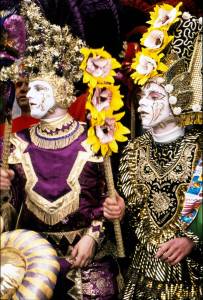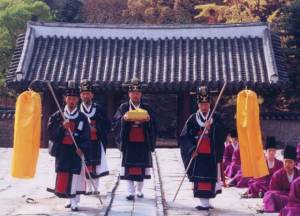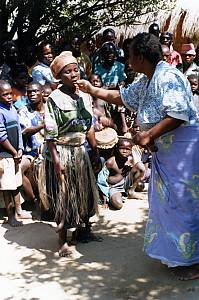Social practices, rituals and festive events are habitual activities that structure the lives of communities and groups and that are shared by and relevant to many of their members. They are significant because they reaffirm the identity of those who practise them as a group or a society and, whether performed in public or private, are closely linked to important events. Social, ritual and festive practices may help to mark the passing of the seasons, events in the agricultural calendar or the stages of a person’s life. They are closely linked to a community’s worldview and perception of its own history and memory. They vary from small gatherings to large-scale social celebrations and commemorations. Each of these sub-domains is vast but there is also a great deal of overlap between them.

© Musée International du Carnaval et du Masque de Binche
Rituals and festive events often take place at special times and places and remind a community of aspects of its worldview and history. In some cases, access to rituals may be restricted to certain members of the community; initiation rites and burial ceremonies are two such examples. Some festive events, however, are a key part of public life and are open to all members of society; carnivals and events to mark the New Year, beginning of Spring and end of the harvest are inclusive occasions common all over the world.
Social practices shape everyday life and are familiar to all members of the community, even if not everybody participates in them. Distinctive social practices that are specially relevant to a community and help reinforce a sense of identity and continuity with the past are given priority in the 2003 Convention. For example, in many communities greeting ceremonies are informal while in others they are more elaborate and ritualistic, acting as a marker of identity for the society. Similarly, practices of giving andreceiving gifts may range from casual events to formal arrangements with significant political, economic or social meanings.

© Cultural Properties Administration
Social practices, rituals and festive events involve a dazzling variety of forms: worship rites; rites of passage; birth, wedding and funeral rituals; oaths of allegiance; traditional legal systems; traditional games and sports; kinship and ritual kinship ceremonies; settlement patterns; culinary traditions; seasonal ceremonies; practices specific to men or women only; hunting, fishing and gathering practices and many more. They also include a wide variety of expressions and physical elements: special gestures and words, recitations, songs or dances, special clothing, processions, animal sacrifice, special food.
Social practices, rituals and festive events are strongly affected by the changes communities undergo in modern societies because they depend so much on the broad participation of practitioners and others in the communities themselves. Processes such as migration, individualisation, the general introduction of formal education, the growing influence of major world religions and other effects of globalization have a particularly marked effet on these practices.

© Francois-Xavier Freland/UNESCO
Migration, especially of young people, may draw those who practise forms of intangible cultural heritage away from their communities and endanger some cultural practices. At the same time, however, social practices, rituals and festive events may serve as special occasions on which people return home to celebrate with their family and community, reaffirming their identity and link to the community’s traditions.
Many communities find that tourists are increasingly participating in their festive events and while there may be positive aspects to tourist involvement, the festivals often suffer in the same way as traditional performing arts. The viability of social practices, rituals and especially festive events may also depend quite heavily on general socio-economic conditions. The preparations, the production of costumes andmasks and providing for the participants is often very expensive and may not be sustainable in times of economic downturn.
Ensuring the continuity of social practices, rituals or festive events often requires the mobilization of large numbers of individuals and the social, political and legal institutions and mechanisms of a society. While respecting customary practices that might limit participation to certain groups, it may also be desirable to encourage the broadest public participation possible. In some cases, legal and formal measures need to be taken to guarantee the access rights of the community to its sacred places, crucial objects, or natural resources necessary for the performance of social practices, rituals and festive events.